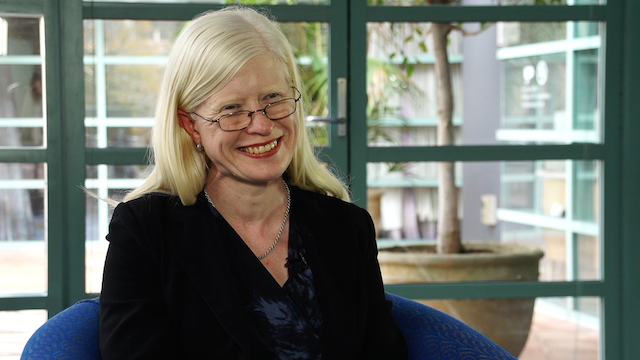Albinism
The Albinism Fellowship of Australia (AFA) http://albinismaustralia.org/ is a national, non-profit organization established in 2005. The fellowship is run by volunteers who all have been personally touched by albinism in some way. The AFA’s key purpose is to provide support, education and fellowship to those with albinism, parents of children with albinism as well as their families and friends. While the albinism community in Australia is only small, the AFA provides a united voice to encourage productive developments and support within business, government and media.
- Details
- In Albinism
- /
 More than 50 snowy-haired people with albinism visit Cairns this weekend for a major conference on the causes, challenges and achievements related to the misunderstood genetic condition.
More than 50 snowy-haired people with albinism visit Cairns this weekend for a major conference on the causes, challenges and achievements related to the misunderstood genetic condition.
With delegates and speakers coming from throughout Australia and New Zealand, the sixth Albinism Fellowship of Australia Biennial Conference will run from Friday, September 25, to Sunday, September 27, at the Hilton Cairns.
Albinism, a genetic condition caused by a lack of pigment in the skin, hair and eyes, is linked to pale skin, white hair and poor eyesight, often in the range of legal blindness. With an occurrence of one in 17,000, Australia has more than 1300 persons with albinism.
Persons with albinism work in all areas of Australian life. AFA members include an MP, a doctor, business owners and senior executives in the public sector. Former Adelaide man, Professor Paul Delaney, who has albinism, is today a leading astronomer in North America.
- Details
- In Albinism
- /
 Prominent Australians with albinism, including an MP, a popular singer and a doctor, have welcomed Australia’s first International Albinism Awareness Day on Saturday, June 13.
Prominent Australians with albinism, including an MP, a popular singer and a doctor, have welcomed Australia’s first International Albinism Awareness Day on Saturday, June 13.
With a statistical likelihood of one in 17,000, Australia has more than 1300 persons with albinism. The genetic condition, which arises from a lack of pigment in the skin, hair and eyes, is linked to pale skin, white hair and poor eyesight, often in the range of legal blindness.
In November last year, the United Nations’ General Assembly adopted a resolution setting June 13 as International Albinism Awareness Day, an historic resolution that fixes albinism advocacy globally.
- Details
- In Albinism
- /
 When Sunshine Coast mother Amanda Collins discovered that her newborn son Mack was legally blind, she was overwhelmed with doubts about his future.
When Sunshine Coast mother Amanda Collins discovered that her newborn son Mack was legally blind, she was overwhelmed with doubts about his future.
So, using the power of the Internet, Amanda threw herself into a journey of learning to find out as much as she could about her son’s condition and what was possible for him.
Mack, who was diagnosed with albinism at just four months of age, has pale, sun-sensitive skin, platinum blond hair and eyesight that is measured as legally blind. Albinism is a rare condition that affects just one in 17,000 persons in Australia.
More News...
Off the Cuff

Simon Hackett speaks about Formula E racing on ABC Radio Adelaide
Australian renewable energy investor Simon Hackett last week spoke to Radio ABC Adelaide's Afternoons host Sonya Feldhoff about the benefits for replacing the cancelled Adelaide 500 motor race with a...
Read more
Seven simple steps for mental health in time of coronavirus
After the summer bushfires, the coronavirus pandemic and associated economic shutdown, “unprecedented” must be a standout favourite for Macquarie Dictionary’s Word of the Year for 2020. For the first time...
Read more
John Harris talks (a bit) about International Albinism Awareness Day on ABC Radio
John Harris, who has the honorary role of PR guy for the Albinism Fellowship of Australia, was interviewed by Peter Goers on the Evenings show of ABC Radio Adelaide on...
Read more
Start-ups are key to the future of everything
Nigel Lake, Executive Chair of global business advisory firm Pottinger, will tell this week's Myriad start-ups festival in Brisbane, running May 16-19, that Australia needs start-ups to protect its prosperity. Pottinger...
Read moreContact
Impress Media Australia
P: +61 8 8431 4000
E: john@impress.com.au
W: www.impress.com.au
Street:
Impress Media Australia
313 Portrush Road,
Norwood SA 5067
Click here for our location
Postal:
Impress Media Australia
Box 95, Kensington Park
South Australia 5068
